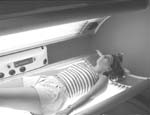Sunbathing Beauties
Tans: summer ‘necessity’ can be a health hazard
Kristin Delorantis
skiff staff
Television, movies, magazines and even walking across the TCU campus suggest to students that tans are a summer necessity.
Obtaining that bronzed look can be achieved a variety of ways, but the question remains: Do any of these methods guarantee a healthy glow?
There are pros and cons to every method of tanning, whether it is laying in a salon tanning bed, soaking up the natural rays or applying a sunless cream, said Linda Stitt, a pharmacist at Eckerd Drugs.
“You need to be careful when going to a salon because some people
go too often for too long,” Stitt said. “Before you go, check
with a doctor. Also, if there is skin sensitivity in the family, you should
not go.”
However, some professionals believe salon tanning should be avoided altogether.
Janet Pena, a nurse at Tarrant Dermatology, said tanning can’t be regulated in salons like it can be outdoors, and it is impossible to recognize the damage until it is done.
Pena said a dermatologist at her office recently treated a patient who
was diagnosed with malignant melanoma, a cancerous dark-pigmented tumor
on her skin that she had acquired from tanning too frequently.
Similar instances have been publicized, but freshman nutrition major Emily Kaszynski said that regardless of what she hears, she will continue to visit salons.
“I know there are health hazards like skin cancer and melanoma,” she said. “But I’m in the sun a lot anyway. I don’t worry about the hazards now. I’ll worry later.”
Absorbing natural rays can also have dangerous repercussions and may actually be worse than salon tanning, Stitt said.
“Tanning beds filter out the bad rays,” she said. “From the sun, you get ultraviolet rays as well, which are the worst for your skin.”
However, considering the Texas sun and harsh heat, it is virtually impossible not to get any color, Pena said. The main component is protection. Everyone needs to wear some sort of sunblock.
Sandy Stafford, a freshman theater-TV major, worked as a lifeguard this summer, and spent the majority of her time in the sun.
“I wore SPF 30 sunscreen because I did not want to burn,” she said. “I also wore a hat and stayed under an umbrella some days. Even with these precautions, I was able to get a tan from spending so many hours outside.”
To obtain a healthy-looking tan while staying out of the tanning beds and remaining indoors this summer, there are several options, Stitt said.
Sunless tanning products on the market provide the same results while preserving the skin, she said.
“I’ve seen a couple of new creams that stimulate the melanin in the skin,” Stitt said. “These products do not dye the skin like the old lotions and creams. Not only are they better for your skin, they are also beneficial because your skin is not being exposed to the sun.”
A recently developed product is Mystic Tan, a spray offered by many tanning salons, Stitt said. To utilize Mystic Tan, the customer simply stands in a small area and waits for 30 seconds while the spray is distributed. After the cycle is complete, the spray dries and the customer is on his or her way.
“I actually use Mystic Tan myself and I am very impressed,” Pena said. “It is safe for your skin and it only takes a quick 30 seconds.”
Although sunless tanning methods have proved effective for some, sophomore fashion merchandising major Kelly Visosky said she has had unpleasant experiences with creams and prefers to visit a tanning salon.
“I’m from Corpus Christi and I really prefer going to the beach,” she said. “But since there are no beaches around here, I go to a tanning salon. I have tried tanning creams but you have to reapply them every two days and most of the time, you end up looking orange.”
Although no method is foolproof, students who feel a tan is vital for the summer months can choose from three primary ways to deepen the skin tone, Stitt said.
But a quick visit to the tanning salon, hours lying in the sun or applying a cream have yet to guarantee that picture-perfect tan.
Kristin Delorantis
kdelo@hotmail.com